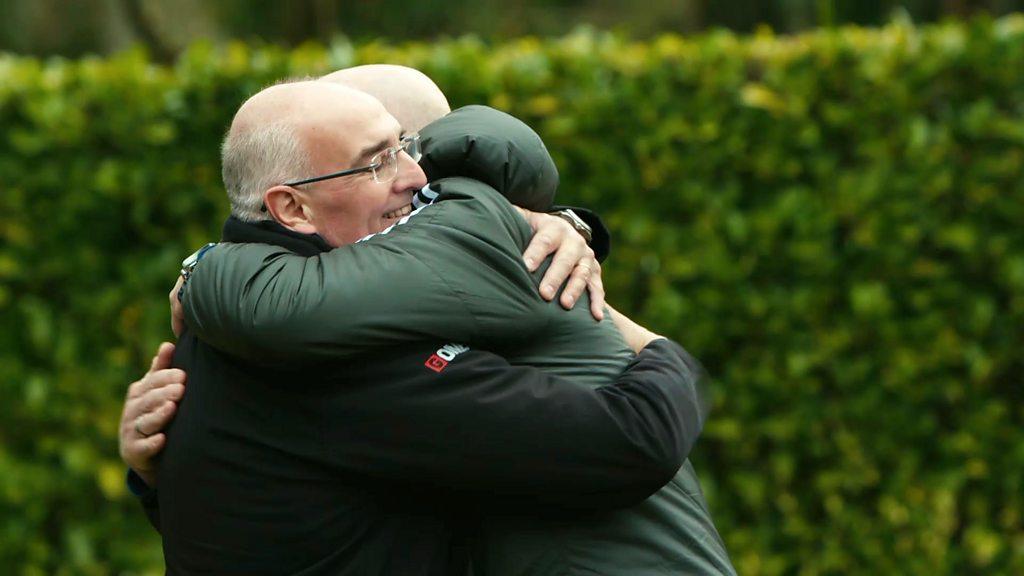Falklands 40: Recalling Royal Marines' stand against invasion
- Published
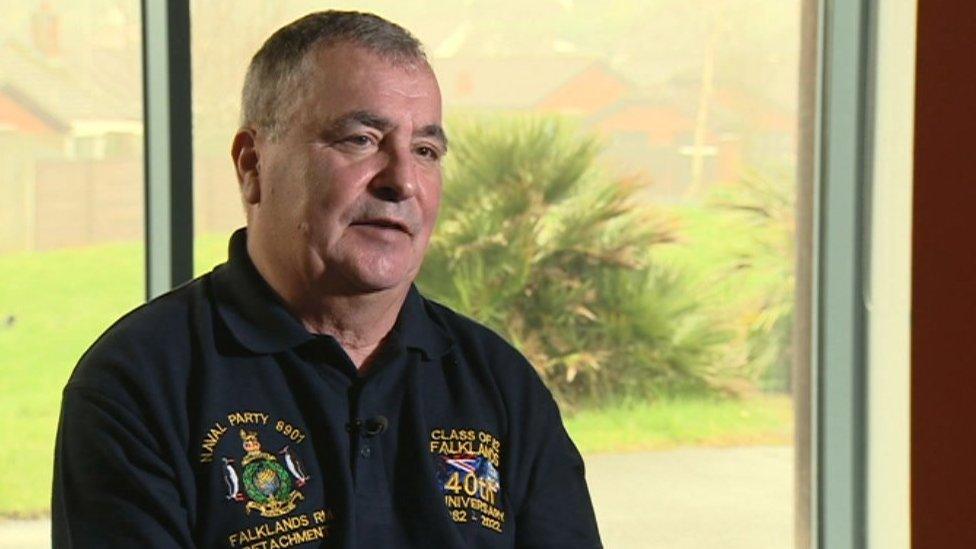
Nick Williams, 66, was stationed in the Falklands when Argentina invaded in 1982
A Royal Marine corporal was told "you will die tonight" as he prepared to defend the Falkland Islands from Argentine forces. Now 40 years on he recalls being one of just 69 British servicemen who mounted a hopeless defence against thousands of invaders.
Then aged 26, Nick Williams was coming to the end of a year's deployment in the South Atlantic when the UK dependency became the centre of world attention.
He was part of a small group of marines who faced Argentina's amphibious and airborne invasion on 2 April 1982.
Outnumbered, they eventually laid down their arms. Within days the Royal Navy task force had set sail to liberate the islands.
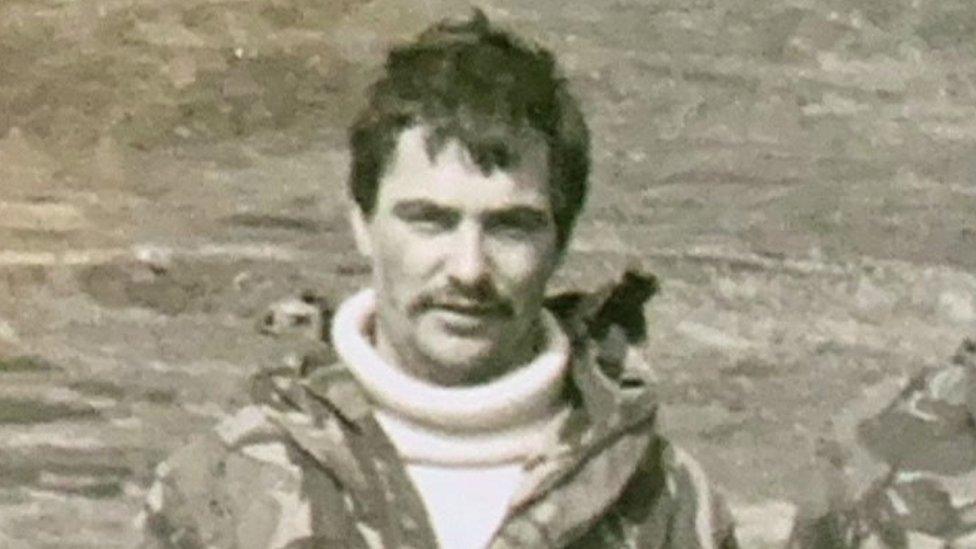
Nick Williams had been stationed on the Falklands Islands for a year before the invasion.
In 1982 the corporal, from Verwood in Dorset, was preparing to leave the Falklands after a year, having "embraced the culture" and even hosting a show on the islands' radio station.
While the garrison troops were aware of Argentine claims on the sparsely-populated islands, they thought any action would be just a "flag waving incident".
"It was always believed they would never invade," Mr Williams said.
"The feeling among the islanders was the Falkland Islands was their home - they were staying."
Tensions ramped up when when an Argentine flag was raised on South Georgia on 19 March, and the marines were told their postings were being extended indefinitely.
'Sense of fear'
On 1 April, Mr Williams was ordered to the island's airport, where the lightly-armed garrison was making preparations after intelligence warnings of an imminent invasion.
A defensive trench was being dug, sensitive documents were burned, and some navy hydrographers - more used to making maritime charts - were given basic sub machine gun training.
Mr Williams said: "I was told 'It looks like we are being invaded in the morning' - quite a sobering moment, there was a real sense of fear."
He recalled being briefed by commanding officer Major Mike Norman with details of the Argentine armada on its way.
"There were three options - we could surrender, take the governor and go for the hills with the governor, and the third option is to meet them on the beaches and fight them," he said.
"It went extremely quiet. I thought 'there is only one outcome from this'."
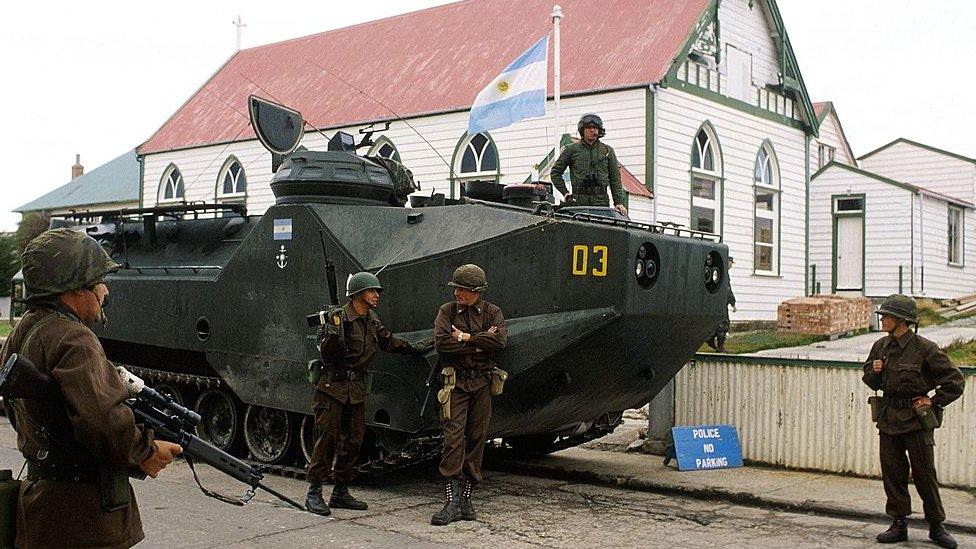
Argentine troops quickly took control of the Falklands capital, Stanley, on 2 April 1982
A plan for a "staggered defence" would see the troops take on invaders before falling back to the capital, Stanley.
"After the briefing he told us 'You need to face facts - you are going to die tonight - there is no resupply, there is no support, no back up - it's just us'. I found it difficult.
"As we got up to leave, someone started whistling 'Always Look on the Bright Side of Life - we all joined it, what else could we do?," recalled Mr Williams.
His section was assigned to the exposed outcrop of Murray Heights, to guard against helicopter landings, with orders to "take out as many as you can and make a fighting retreat".
'Horrific screaming'
With a colleague he spent the "unnerving" night hours waiting on the exposed windswept rocky outcrop, fearing an air strike or artillery fire.
He said: "We made a pact that we would stay and keep firing until we were overwhelmed.
"If worst comes to the worst, I'd rather be shot facing them than running away. There was no way out.
"It all erupted at five in the morning - explosions, the sky was lit up with tracer and it all kicked off."
Argentina had attacked the garrison's now-deserted HQ building, and the group were called back to Stanley, which Mr Williams recalled was "swarming" with enemy soldiers.
"All you could hear was the explosions from various places in Stanley and this screaming - horrific screaming," he said.
"We fought through Stanley. All the buildings are made of wood so there was no cover from [gun] fire."

What was the Falklands War?
On 2 April 1982, Argentina invaded the Falkland Islands, a remote UK colony in the South Atlantic.
Argentina said it had inherited the islands from Spain in the 1800s and wanted to reclaim sovereignty of them.
The UK, which had ruled the islands for 150 years, quickly chose to fight, leading to a brief but bitter war lasting 74 days.
In the fighting that followed, 655 Argentine and 255 British servicemen lost their lives, as did three Falkland Islanders.
British forces regained control of the Falklands on 14 June 1982.

Surrounded on three sides and faced with a convoy of Argentine armoured personnel carriers heading towards the settlement, the marines had nowhere left to mount a defence, so eventually handed themselves over to the invaders.
Five Argentine soldiers are thought to have been killed during the invasion. The British forces suffered no serious injuries.
Aware of the military junta's reputation, Mr Williams still feared "it could end very badly".
He said: "I thought was 50-50 if they would kill us - when you put your weapon down, its like being completely naked."
The British contingent was shortly afterwards flown to Montevideo and repatriated to the UK.
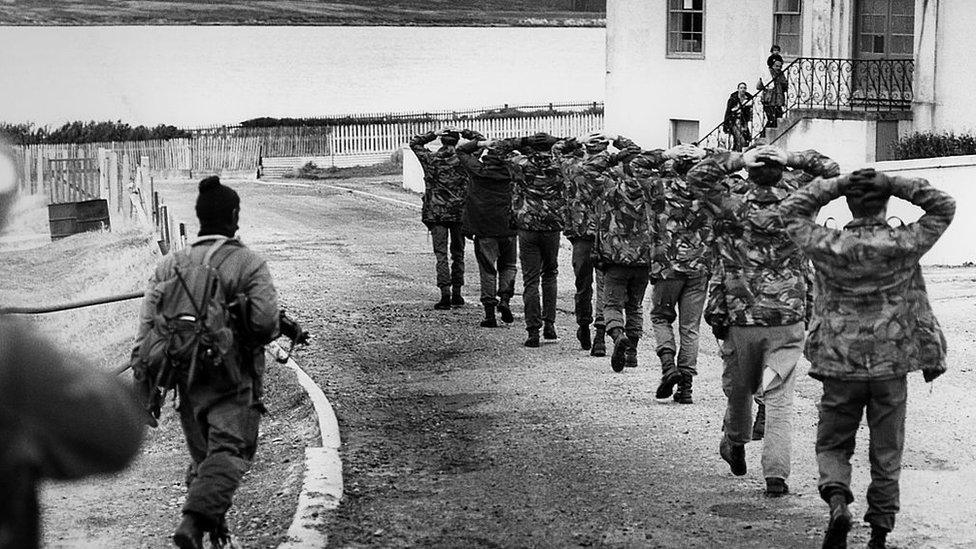
The outnumbered Royal Marines eventually laid down their arms
Forty years on, Mr Williams still feels angry about the tabloid press reporting it at the time as a "surrender with barely a shot fired".
On the flight home, they received a message from Prime Minister Margaret Thatcher telling the group they must remain silent about their experience.
"There was not one word of 'you did a good job'," he said.
"Rex [Hunt - The Falklands Island governor] was extremely angry, he told us - 'I will promise you I will set the record straight'"
"We were called the 'white flag brigade' - I've learnt to deal with it. Sixty-nine marines, not a single gallantry award.
"You know you are going to lose, but you still have a go. Knowing a lot of you would get killed, and to go out and mount the actual defence we put up, I'm extremely proud."

Follow BBC South on Facebook, external, Twitter, external, or Instagram, external. Send your story ideas to south.newsonline@bbc.co.uk, external.
Related topics
- Published20 January 2022
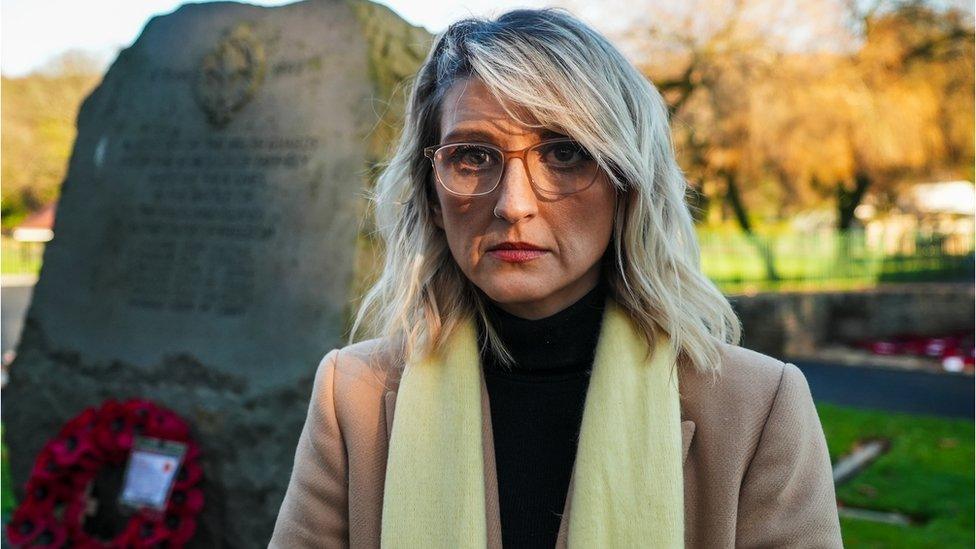
- Published8 December 2021
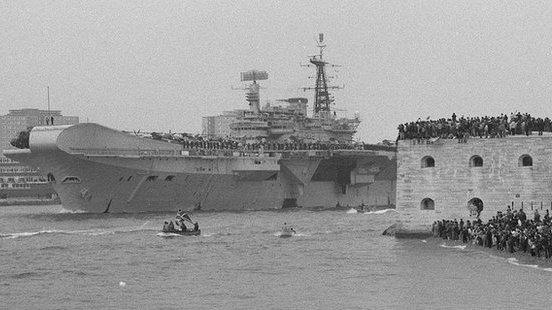
- Published13 May 2021
